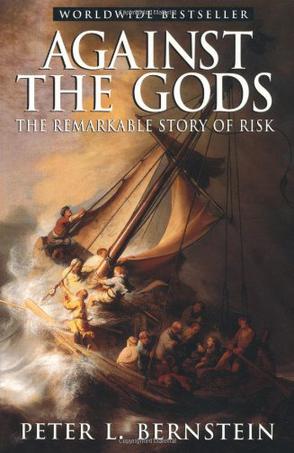
目录
Acknowledgments ix
Introduction 1
TO 1200: BEGINNINGS
1. The Winds of the Greeks and the Role
of the Dice 11
2. As Easy as I, II, III 23
1200–1700: A THOUSAND OUTSTANDING FACTS
3. The Renaissance Gambler 39
4. The French Connection 57
5. The Remarkable Notions of the Remarkable Notions Man 73
1700–1900: MEASUREMENT UNLIMITED
6. Considering the Nature of Man 99
7. The Search for Moral Certainty 116
8. The Supreme Law of Unreason 135
9. The Man with the Sprained Brain 152
10. Peapods and Perils 172
11. The Fabric of Felicity 187
1900–1960: CLOUDS OF VAGUENESS AND THE DEMAND FOR PRECISION
12. The Measure of Our Ignorance 197
13. The Radically Distinct Notion 215
14. The Man Who Counted Everything Except Calories 231
15. The Strange Case of the Anonymous Stockbroker 247
DEGREES OF BELIEF:EXPLORING UNCERTAINTY
16. The Failure of Invariance 269
17. The Theory Police 284
18. The Fantastic System of Side Bets 304
19. Awaiting the Wildness 329
Notes 339
Bibliography 353
Name Index 365
Subject Index 369
【展开】
【收起】
内容简介
在线阅读本书
Book Description
Human existence is based upon risk. This text charts the adventures of a group of thinkers who embarked on a voyage of intellectual discovery, transforming primeval superstition into the powerful tools of risk control employed today.
Amazon.com
With the stock market breaking records almost daily, leaving longtime market analysts shaking their heads and revising their forecasts, a study of the concept of risk seems quite timely. Peter Bernstein has written a comprehensive history of man's efforts to understand risk and probability, beginning with early gamblers in ancient Greece, continuing through the 17th-century French mathematicians Pascal and Fermat and up to modern chaos theory. Along the way he demonstrates that understanding risk underlies everything from game theory to bridge-building to winemaking.
From Publishers Weekly
Risk management, which assumes that future risks can be understood, measured and to some extent predicted, is the focus of this solid, thoroughgoing history. Probability theory, pioneered by 17th-century French mathematicians Blaise Pascal and Pierre de Fermat, has made possible the design of great bridges, electric power utilities and insurance policies. The statistical sampling methods invented by dour Swiss scientist Jacob Bernoulli undergird diverse activities such as the testing of new drugs, stock-picking and wine tasting. Bernstein (Capital Ideas) animates his narrative with a colorful cast of risk-analyzers, including gambling addict Girolamo Cardano, 16th-century Italian physician to the Pope; and John Maynard Keynes, whose concerns over economic uncertainty compelled him to recommend an active, interventionist role for government. Bernstein also traces the development of business forecasting, game theory, insurance and derivatives, and surveys recent advances in risk forecasting made possible through chaos theory and by the development of neural networks.
From Library Journal
For several centuries, mathematics has been the language of the exact sciences. Only in the 20th century has mathematics become predominant in other fields, particularly economics and finance. In this book, Bernstein (Capital Ideas: The Improbable Origins of Modern Wall Street, LJ 12/91), head of an economic consulting firm, traces the development of probability theory from its beginnings in analyzing games of chance, through its application to statistical theory and insurance, up to its present use in developing investment strategies to control risk. He includes excellent sections on portfolio analysis and on investments in derivatives. Bernstein clearly describes the people, their work, and the events that have revolutionized the thinking on Wall Street. A worthwhile acquisition for business and math collections.
Harold D. Shane, Baruch Coll., CUNY
From Booklist
Bernstein's lively history chronicles a profound transformation in attitudes about the future. How one's fate changed from depending less on capricious outcomes and more on predictable ones forms the backbone of the narrative. His central characters are mathematicians who began pondering the statistics of gambling, or gamblers pondering the risks of gambling: about one sixteenth-century polymath, Girolamo Cardano, Bernstein writes that his "credentials as a gambling addict alone would justify his appearance in the history of risk," and that comment is typical of Bernstein's engaging presentation. Amid his recounting of the insights into probability from Pascal to Keynes, he touches on an array of modern fields in which risk analysis is crucial--insurance, commodities futures, stock markets, and that old standard, gambling. This cornucopia of biographical sketches, mathematical examples, and reflections on the nature of human expectations about the future faces little risk of idling in libraries; patrons of the business section might be keenest to read it.
Gilbert Taylor
From AudioFile
Jesse Boggs honed his expressive, laid-back vocal style narrating his own award-winning documentaries. Here, as reader and abridger, he goes a long way to clarify Bernstein's convoluted theory of risk management. His careful phrasing also brings into high relief the sweeping generalizations and questionable axioms that give pause to the analytic listener. Only in this careful frame of mind can one separate wheat from chaff and learn whatever this book has to teach. Y.R.
The Washington Post Book World, September 20, 1998
AGAINST THE GODS appeared in the "Washington Is Also Reading..." section of The Washington Post Book World. The book is described as, "A comprehensive history of man's efforts to understand risk and probability, from ancient gamblers in Greece to modern chaos theory."
Book Dimension
length: (cm)22.7 width:(cm)15.2
【展开】
【收起】
下载说明
1、追日是作者栎年创作的原创作品,下载链接均为网友上传的的网盘链接!
2、相识电子书提供优质免费的txt、pdf等下载链接,所有电子书均为完整版!
下载链接